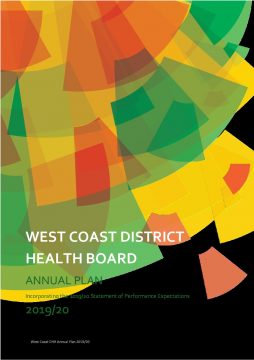This document is our Annual Plan which has been prepared to meet the requirements of the New Zealand Public Health and Disability Act, Crown Entities Act, Public Finance Act, and the expectations of the Minister of Health.
Linking with our Statement of Intent, this document sets out our strategic goals and objectives and describes what we aim to achieve in terms of improving the health of our population and ensuring the sustainability of our health system. It also contains our Statement of Performance Expectations for the coming year and actions we will take in response to national priorities and expectations in 2019/20.
The Statement of Performance Expectation is presented to Parliament and used at the end of the year to compare planned and actual performance. Audited results are presented in our Annual Report.
The West Coast DHB has made a strong commitment to ‘whole of system’ service planning. We work collaboratively and in partnership with other service providers, agencies and community organisations to meet the needs of our population and support a number of clinically-led Alliances as key vehicles for implementing system improvement and change.
Our alliance framework means we share a joint vision for the future of our health system with our alliance partners and agree to work together to improve health outcomes for our shared population. This includes our local West Coast Alliance with the West Coast PHO, the South Island Regional Alliance with our four partner South Island DHBs and our transalpine partnership with the Canterbury DHB.
The DHB recognises its role in actively addressing disparities in health outcomes for Māori and we are committed to making a difference. We work closely with Tatau Pounamu and Poutini Waiora, directly and through the West Coast Alliance, to improve outcomes for Māori in a spirit of communication and co-design that encompasses the principles of Te Tiriti o Waitangi.
In signing this document, we are satisfied that it fairly represents our joint intentions and activity, and is in line with Government expectations for 2019/20.

